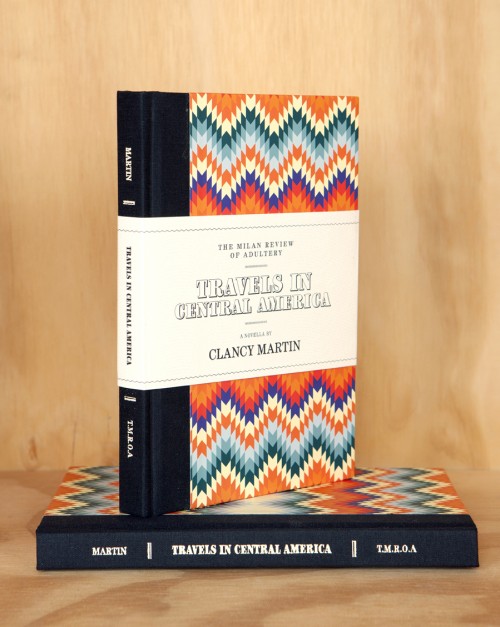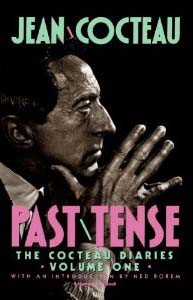Gene Wolfe Chosen as SFWA Grand Master
The SFWA (Science Fiction and Fantasy Writers of America) has named one of my favorite writers, Gene Wolfe as the 2012 recipient of the Damon Knight Memorial Grand Master Award. Which is like being the Chaos Lord of American sci-fi/fantasy writers.
How Should A Humon Be, I Hate These Humons: The Great Autobiographical Fiction vs. Anti-Autobiographical Fiction Showdown 2k12/2k13
A thing I’ve been noticing is a formation of camps of a sort along the lines of how people feel about autobiographical fiction. Is this a thing?
I thought of this upon reading the title of a Tumblr post by my friend, James Tadd Adcox, a list of things he’s currently reading. The title: “Take this blue paint, cake it on your pale face. Make yourself something other than this world.” Something other than this world.
The Milan Review of Adultery

The Milan Review publishes pretty books.
Its newest pretty thing is a book by Clancy Martin.
Critical Analyses of Big L’s Most Sexually-Charged Lines
“Talkin’ bout ‘rhyme for me, L.’ Man, fuck rhymin’, cos my dick is hard enough to cut diamonds.” Clinic (Shoulda Worn a Rubber)
The diamond is commonly known one of the hardest materials on earth found in any natural deposits. I think lately people have engineered or found stuff that’s harder, but for argument’s sake let’s say the ‘diamond’ is the hardest material known to man. Big L is experiencing such a heightened state of arousal that his cock is now hard enough to cut through the hardest material known to man. Unbeknownst to the listener is whether L himself ever used said member to copulate with the pursued female partner, Joelle, earlier in the storyline. If he did, she almost certainly suffered terrible wounds and lacerations and has since been rendered unable to conceive, let alone experience a true orgasm. It truly makes one wonder about how far rappers are pushed to perform sexually by fans and “groupies” and whether L’s insatiable demon peen didn’t in some way lead to his demise. (He was shot, right? Maybe his diamond-esque sword in some way became magnetic to bullets? One can never be certain about these things.)
P.S. Big L does not want to “rhyme” for Joelle because unfortunately he’s become terribly preoccupied by anything but sex and hence will not be able to do or think about anything but until satisfaction has been reached.
“I knocked the boots from New York to Santa Fe, and that bitch burnt me like a gamma ray.” Same song, later on.
Now here L has set aside his scruples and become cantankerous in the face of a sexually transmitted disease, and though his previous chivalry has put him into this situation with Joelle, it’s now been cast aside in disgust due to that pesky predator, “Gonorrhea.” However, it seems prudent to note L’s ability to boast about knocking “the boots from New York to Santa Fe,” and admit with full candor in the following stanza that he was “burnt like a gamma ray.” Such emotional honesty balanced against stoic egotism has assuredly not been felt since Norman Mailer’s Advertisements For Myself and here we not only have the author’s pants down showcasing his manhood in all its infected glory, we have a protagonist so afflicted by circumstance that the only response he can summon up is a quick, Shakespearean revenge plot. L asserts, “Yo I’mma kill that bitch, next time that I see her,” and it’s not since the Bard that two star-crossed lovers were faced with such unfortunate miseries.
“Fuck around you’ll find my silk boxers in your mother’s hamper.”
Big L & Jay Z Freestyle
Here we return to the themes of old in which the young, spry Big L feels certain that if anyone should have the gall to challenge him or affront his person in anyway, he’ll bed their mother almost instantly. So instantly, in fact, that the proverbial you—a young man equally spry though perhaps not quite as sharp, and what’s more you often dig through your mother’s hamper (?)—will soon find L’s “silk boxers in your mother’s hamper.” This is the ultimate revenge story because the tragedy for the victim occurs long after the fact. Will you walk in on L with his hands cascading anxiously over your mother’s supple flesh? Will you see them at Denny’s late one night after seeing Liam Neeson’s newest picture? No. You will be left to stew in ignorance and curiosity as to whether these boxers, silken and inscribed with the man’s name, could possibly have reached your mother’s hamper through the depraved acts of which you dare not speak. READ MORE >
Holiday Shopping Guide: Nonfiction Recommendations

An absolute ton of killer nonfiction titles got published in 2012. In fact, when it comes time to reveal my “Ten Best Books of 2012” it’s likely that half (if not more) of my choices will be nonfiction.
For the purposes of this post, I’m going to select twenty titles. And I’ll present them in no particular order. These obviously represent my own interests (film, philosophy, fashion, art, music, and literature) and therefore omit plenty of titles I’m sure were great, but fall outside my purview: politics, economics, etc.
If you’re like me and haven’t even begun shopping yet, hopefully this list will help you find something for someone.
‘I now pronounce you…’
Before the advent of modernism at the turn of the 20th Century, narratives usually ended with an engagement, a wedding, or a death. The protagonists of the relatively new novel form would find themselves paired off at the altar, or suffering their own demise. This narrative move demonstrates the power of marriage as a kind of full stop, a solution, a smoothing-over, the point that a relationship should be headed, even if it may fail on the way. It’s significant that although writers have since cast aside marriage as the standard form of plot resolution, marriage itself still remains a potent cultural force in the 21st century.
I want to make it clear that I’m talking about a Western cultural understanding of marriage, which over the course of the 20th and 21st centuries has become a predominantly secular affair, where subjects are able to freely choose their own spouses, and virginity and chastity are no longer prerequisites. This is based on current marriage trends, although there will always be specificities and areas of difference. It’s also important to recognise that the concept of marriage has an array of different meanings and traditions in other cultures, both secular and religious, which are far too vast for me to even attempt to discuss here.
December 7th, 2012 / 4:42 am
In a syllabus, I called it NECROMANCER instead of NEUROMANCER. Oops.
Are you a romantic? Do you think there’s more romance irl or in books? If in books, reading or writing them?
~ index.cgi?q=reading&width=1373&anim=yes ~
“Reading” is a word that can become a search term. At one website, it is possible to search for only animated images, given a specific word or phrase. These remind me that everyone looks different when they read. Reading is an activity with a necessary 3rd person visual component. I don’t really understand how someone can look like they are reading. It is like those people who try to look like they are paying attention during a meeting,

Cocteau, the shelf, the lunacy
 I start out endeavoring to write about those things I know; those authors I know; those films I know; those artists I know, because the chance of publishing something online and the rest of the world instantly knowing more about it than me simply isn’t weighed in my favor, so I want to start with something I know. Obscurity can work in my favor here. Choosing to review, say, Self Portrait by Man Ray will prove far less disputable than another slant on the terrifying depths of the sentences in Infinite Jest; so I may be wise to look to those lesser-discussed works on my bookshelf considering derision isn’t something I enjoy. Furthermore, and aside from obscurity or the arcane, I’m going to want to focus on the personal elements of the topic as opposed to those more general observations ever-present in every other publication on earth. This isn’t a critique of Mad Men for The New Yorker, this isn’t my attempt to reconcile the efforts of Frank Ocean as measured against the palpitations of James Brown, this is something different, and personality shouldn’t hide away at this most pivotal moment in my life as a hack critic postulating endlessly with cheap literary fiction tricks.
I start out endeavoring to write about those things I know; those authors I know; those films I know; those artists I know, because the chance of publishing something online and the rest of the world instantly knowing more about it than me simply isn’t weighed in my favor, so I want to start with something I know. Obscurity can work in my favor here. Choosing to review, say, Self Portrait by Man Ray will prove far less disputable than another slant on the terrifying depths of the sentences in Infinite Jest; so I may be wise to look to those lesser-discussed works on my bookshelf considering derision isn’t something I enjoy. Furthermore, and aside from obscurity or the arcane, I’m going to want to focus on the personal elements of the topic as opposed to those more general observations ever-present in every other publication on earth. This isn’t a critique of Mad Men for The New Yorker, this isn’t my attempt to reconcile the efforts of Frank Ocean as measured against the palpitations of James Brown, this is something different, and personality shouldn’t hide away at this most pivotal moment in my life as a hack critic postulating endlessly with cheap literary fiction tricks.
I choose the selection of books on my shelf by Jean Cocteau, but mostly just the journals Past Tense as they were the most affecting and accessible amid copies of The Imposter or Opium or The Holy Terrors—though these feature drawings by Cocteau I dog-eared and revisit frequently. I’d like to discuss the effects of his films on me or his literature as a whole and I recall in the first volume of Past Tense much of his time is taken up either with theater productions or the making of one of his films (part of the Orphic trilogy, if memory serves though it could’ve been La Villa Santo-Sospir). But really I want to focus on the merits of his journals themselves and the narrative depths achieved in a relatively simple manner but with such savvy that I’ve become convinced a part of my life might be devoted to such journaling, though I hardly measure myself as equivalent with Cocteau.
The experience reminds me of reading the notable journals of May Sarton; brief, artful things describing both the internal considerations of an artist nearing the end of his life and the actual creation of paintings, films, and theater productions—a selling point, I’d think, for anyone even moderately intrigued by Cocteau the man. His descriptions of home life, of say reading Dumas or Proust for the umpteenth time leave you breathless and in turn wanting more, wanting to reread certain things yourself and share the experiences with this elusive and vexing figurehead of art; this French devil who flew so deftly under the surface his entire life as to be acknowledged as a great visionary by known artists but in the public treated simply as a staple and artist, with little consideration given beyond that.
November 28th, 2012 / 12:00 pm
Dear Narrative Magazine: Please Die in a Fire (Also, Kindly Remove Me from Your Mailing List)
Dear Narrative Magazine,
Recently, I began to receive e-mails promoting your publication, in spite of the fact that I have never in any way expressed interest in you or what you do. I have never submitted to your magazine (because you are clearly a scam operation) and I have never given you any reason to believe I might do so in the future. I have never read anything in your pages, because I detest you. There is simply no ethical means by which you could have obtained my e-mail.
When you began sending me spam, I attempted to unsubscribe from your mailing list. I spoke to other writers who hold you in similar disregard, and they said that they had been trying to unsubscribe from your mailing list for months, and that it was impossible. You wouldn’t leave them alone. I sent you several hateful tweets (because I hate you). I unsubscribed again just to make sure. Maybe I unsubscribed a third time? I don’t remember.
Today I received another spam e-mail from you. I do not admire your tenacity. You are pond scum. I can ignore this fact when you aren’t spamming me but I can’t when you are. My e-mail address is mike(d0t)meginnis(at)gmail(dot)com. Take it off your mailing list immediately. (I mean it. This is not optional. You are going to do this now.)
I invite anyone else who would like Narrative Magazine to stop e-mailing them to post about it in the comments. (Dear Narrative: These other e-mails won’t be optional either.)
With All My Contempt,
Mike Meginnis.






